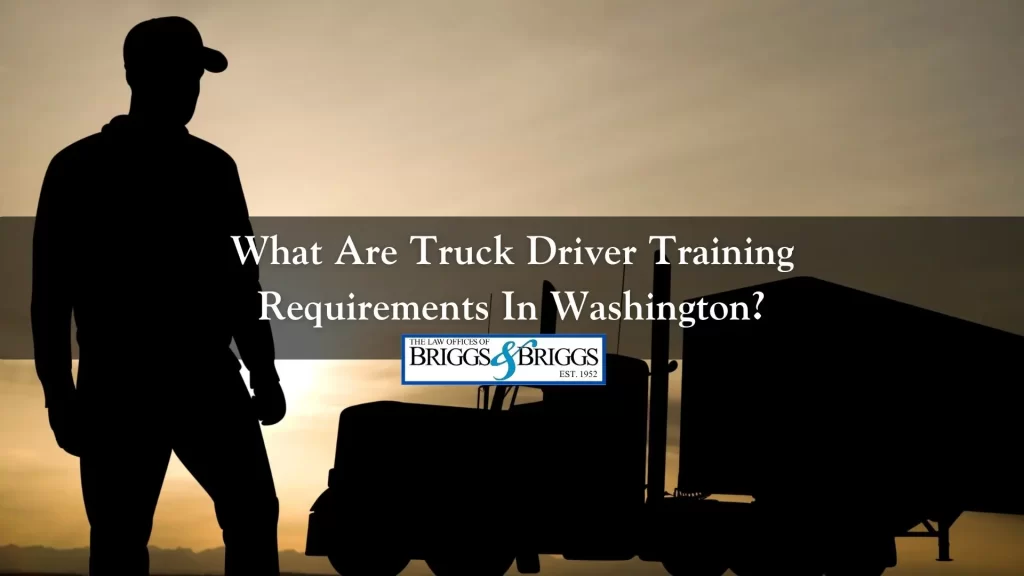Posted on Tuesday, November 1st, 2022 at 6:06 pm
 Not just anyone can get behind the wheel of a big-rig truck. Truck drivers are professionals, meaning they must adhere to specific state and federal training requirements. Maneuvering an 80,000-pound, fully loaded-vehicle is both challenging and stressful. State and federal requirements are in place to ensure that professional drivers have the training and resources they need to handle the job.
Not just anyone can get behind the wheel of a big-rig truck. Truck drivers are professionals, meaning they must adhere to specific state and federal training requirements. Maneuvering an 80,000-pound, fully loaded-vehicle is both challenging and stressful. State and federal requirements are in place to ensure that professional drivers have the training and resources they need to handle the job.
Truck accidents are devastating events that can cost you your health and livelihood. At The Law Offices of Briggs & Briggs, we believe you deserve to know what truck driver training requirements are in place—knowing what a truck driver must go through to become qualified puts you in a better position to understand whether a careless or inexperienced driver caused a significant accident.
Washington State CDL License Requirements
One of the first things a driver must do to be able to operate a semi-truck is earn their Commercial Driver’s License. Those over 18 with a valid Washington state driver’s license can apply for a CDL license in Washington. However, to operate a commercial vehicle, drivers in Washington must be at least 21.
The minimum requirements for obtaining a CDL include:
- 18 years of age
- Valid Washington state driver’s license
- Proof of U.S. citizenship or lawful permanent residence
- Pass the knowledge examination
- Earn a Commercial License Permit or CLP
- Submit all training documentation for approval
- Pass a skills test
There are also physical requirements for earning a Washington CDL. Drivers must submit required medical documentation proving they meet all necessary physical requirements:
- Vision in both eyes must be 20/40
- Ability to distinguish colors
- Ability to perceive a forced whisper at a distance of at least five feet
- Maximum blood pressure of 160/100
- If diabetic, the condition must be controlled through diet or medication. Diabetics who manage the condition with insulin injections are prohibited
- Blood sugar no higher than 200
- No use of any Schedule I substance or narcotics
Washington Minimum Training Hours
Depending on the CDL license a driver is seeking, the state also requires a set of minimum training requirements.
To apply for a CDL Class A license, you must have 160 total hours of training, including:
- 40 hours of classroom instruction
- 18 hours of street driving training
- 16 hours of backing maneuvers
- 16 hours of proficiency development
- 70 hours of combined lab and range training, plus observation
For a Class B license, the minimum training requirements are 80 hours total of at least:
- 40 hours of classroom instruction
- 14 hours of street driving training
- 8 hours of backing maneuvers
- 8 hours of proficiency development
- 10 hours of combined lab and range training, plus observation
To secure a Class C license, an individual needs 80 total hours of instruction:
- 40 hours of classroom instruction
- 14 hours of street driving training
- 8 hours of backing maneuvers
- 8 hours of proficiency development
- 10 hours of combined lab and range training, plus observation
Federal Truck Driver Training Requirements
Different states have different regulations, meaning the U.S. has traditionally taken a hodge-podge approach to truck driver education and training. This approach poses a significant problem since many commercial truck drivers must cross state lines. However, as of February 7, 2022, the federal government stepped in to establish a more consistent baseline education for entry-level truck drivers.
- A Class A or Class B CDL for the first time
- Upgrading an existing Class B CDL to a Class A
- Obtaining a school bus, passenger, or hazardous materials endorsement for the first time
Entry-level drivers must now complete mandatory FMCSA training programs. The agency also established a registry containing the records of CDL applicants who have met all the new training and certification guidelines. While the rules are not retroactive, the federal agency hopes the new regulations will provide more consistent training for new truck drivers and those seeking to upgrade their licenses.
The Washington State Department of Licensing provides a comprehensive list of locations offering CDL training schools for those who want to earn their CDL license.
Contact an Experienced Lakewood Truck Accident Attorney
Truck driver training requirements have become more rigorous thanks to the efforts of the FMCSA. However, that doesn’t mean all drivers have the skills to avoid a potentially significant collision. If a careless truck driver has injured you or a family member, talk to an experienced Lakewood truck accident attorney today.
At The Law Offices of Briggs & Briggs, we have the resources to thoroughly investigate truck accidents and seek meaningful compensation from those at fault. Let our team pursue the compensation you deserve. Call our office at (253) 588-6696 to set up a free legal consultation.
Related Posts
What Is A Truck Driver’s Travel Log?

